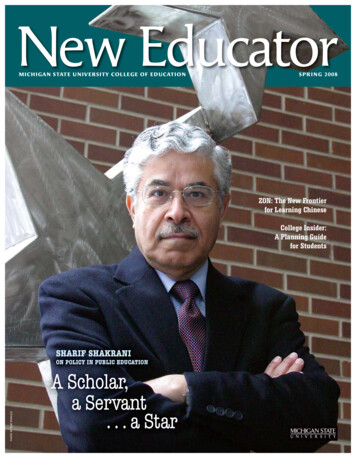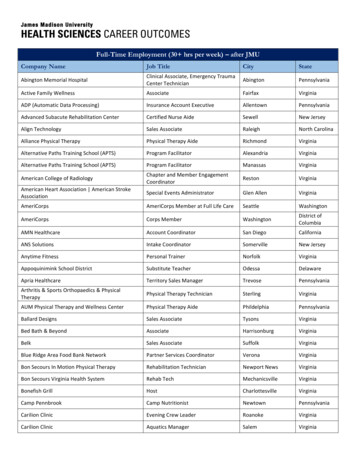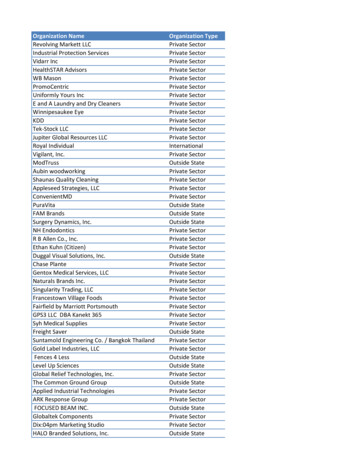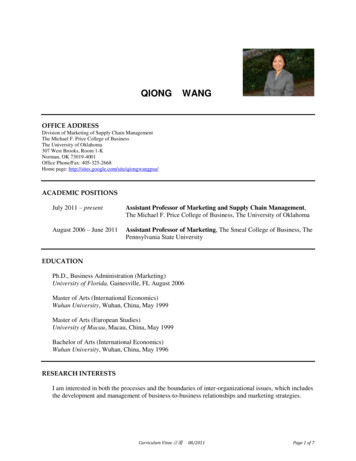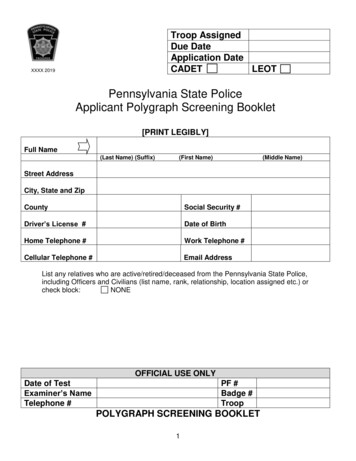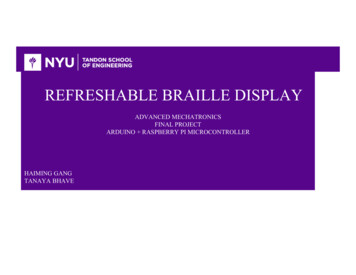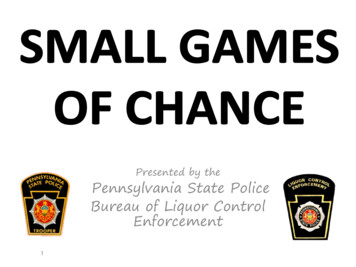
Transcription
Presented by thePennsylvania State PoliceBureau of Liquor ControlEnforcement1
THE SMALL GAMES OF CHANCE ACT Act 2 of 2012 was signed into law by the Governor onFebruary 2, 2012 and made sweeping changes to the LocalOption Small Games of Chance Act originally enacted in 1988. Act 184 of 2012 was signed into law on October 25th, 2012amended some of the changes in Act 2. Acts 90 & 92 of 2013, effective January 27, 2014, furthermodified the Act.
THE SMALL GAMES OF CHANCE ACTThe information being provided in this presentationis based upon our interpretation of the statute andlike many new laws, is subject to interpretation andfurther clarification by the courts going forward.
OVERVIEW Gambling– Definition– Legal vs. Illegal Gambling Small Games of Chance Act– Application– Permitted Games– Use of Proceeds– Prize Limits4
OVERVIEW(CONTINUED) Small Games of Chance Act (CONTINUED)– Discussion of Individual Games– Licensed Premises and Location of Games– Gambling in P.L.C.B. licensed establishments– Record Keeping/Reporting Requirements– Penalties5
GAMBLING6
GAMBLING What activitiesconstitute “gambling”in Pennsylvania? The Pennsylvania Crimes Code listsvarious gambling offenses:7
PENNSYLVANIA CRIMES CODE Section 5513 Gambling Devices, Gambling,Etc – (a) Offense Defined. A person is guilty of a misdemeanorof the first degree if he:(1) intentionally or knowingly makes, assembles, sets up,maintains, sells, lends, leases, gives away or offers forsale, loan, lease or gift, any punchboard, drawing card,slot machine or any device to be used for gamblingpurposes, except playing cards
PENNSYLVANIA CRIMES CODE(continued)(2) allows persons to collect and assemble for the purpose ofunlawful gambling at any place under his control(3) solicits or invites any person to visit any unlawful gamblingplace for the purpose of gambling; or(4) being the owner, tenant, lessee, or occupant of anypremise, knowingly permits or suffers the same, or any partthereof, to be used for the purpose of unlawful gambling
GAMBLING However, there is NO definition ofgambling in the Crimes Code. Gambling is not specifically definedby Statute in Pennsylvania. Instead we must to refer toCommonwealth Court decisions todefine gambling.10
GAMBLINGPENNSYLVANIA COURTS HAVE DETERMINED THATGAMBLING CONSISTS OF THREE BASIC ELEMENTS:(PLCB V. PPC CIRCUS BAR, INC.)CONSIDERATION CHANCE REWARD GAMBLING11
ELEMENTS OF GAMBLING Let’s look at each of the three elements individually:– Consideration– Chance– RewardKeep in mind – All three elements must be present to establish that anactivity constitutes gambling.12
CONSIDERATION COST TO BEGIN PLAY OR EVENT– bet– wager EXAMPLES– block purchase in pool– “buy-in” in poker tournament– purchase of pull tab– money in slot machine13
CHANCE EVENT OUTCOME BASED WHOLLY OR PREDOMINANTLYON CHANCE– “Dominant Factor Test”– Individual has little to no effect over outcome EXAMPLES– roll of dice or turn of card– result of race or sporting event SKILL– to be considered a skill, a person would have to be able tomaster the game Darts, billiards, etc. Playing poker may involve some skill or knowledge, however the cardsare still dealt randomly14
REWARD Return to player for winning event– May be cash, merchandise, service or anything of value– For video games, free games DO NOT constitute reward. If the value of the available prize(s) for an individualchance is less than the cost of the chance(consideration), then the contest is not gambling– E.G. Duck Pond Game15
LEGAL VS. ILLEGAL GAMBLING Currently, the only forms of gambling authorized bystatute in Pennsylvania are:– Gambling activities conducted pursuant to the HorseRacing Industry Reform Act.– Pennsylvania Lottery– Bingo conducted pursuant to the Bingo Law– Gambling activities conducted pursuant to the LocalOption Small Games of Chance Act (including taverngames)– Gambling activities conducted pursuant to thePennsylvania Race Horse Development and Gaming Act(slots).16
LEGAL VS. ILLEGAL GAMBLINGPA Superior Court DecisionCommonwealth vs. Betres(1975)“Unlawful gambling is ANYgambling that has not beenauthorized by Legislature.”
COMMON UNLAWFUL GAMBLINGACTIVITIES Texas Hold’em TournamentsPaddle AuctionsCasino NightsSports Pools – football, basketball, NASCAR, etc.Vertical wheel or “Chuck-a-Luck Wheel”Video Gambling Devices - video poker or slotsNONE OF THESE ACTIVITIES ARE AUTHORIZEDBY THE SMALL GAMES OF CHANCE ACT18
THE SMALL GAMES OFCHANCE ACT19
LEGISLATIVE INTENT§ 102. Legislative intentThe General Assembly hereby declares that the playing of small games of chance for the purposeof raising funds, by certain nonprofit associations, for the promotion of charitable or civicpurposes, is in the public interest. In some cases the proceeds from games of chance may beutilized to support certain operating expenses of certain organizations.The General Assembly hereby declares that raising public funds from games of chance in licensedrestaurants and protecting the competitiveness of these restaurants is also in the public interest.It is hereby declared to be the policy of the General Assembly that all phases of licensing,operation and regulation of games of chance be strictly controlled, and that all laws andregulations with respect thereto as well as all gambling laws should be strictly construed andrigidly enforced.The General Assembly recognizes the possibility of association between commercial gamblingand organized crime, and wishes to discourage commercialization of small games of chance,prevent participation by organized crime and prevent the diversion of funds from the purposesherein authorized.(EMPHASIS ADDED)20
TYPES OF LICENSES Regular License – issued to eligible organizationswhich own their own premise or lease a specificlocation to conduct normal business. Permitsholders to operate SGOC during entire licensing year.( 125) Monthly License - permits eligible organizations withor without a premise to conduct games of chance fora 30-consecutive-day period. ( 25)– No restriction on number of monthly licenses.– Monthly licensing periods may not overlap.21
ELIGIBLE ORGANIZATIONSA charitable, religious, fraternal or veterans'organization, club, club licensee or civic and serviceassociation. In order to qualify as an eligibleorganization for purposes of this act, an organizationshall have been in existence and fulfilling its purposesfor one year prior to the date of application for alicense. The term shall include an affiliated nonprofitorganization of a Major League sports team licensedunder section 307.
ELIGIBLE ORGANIZATIONSA Major League Sports Team is one of the following: A member of Major League Baseball, the National Hockey League,the National Basketball Association, the National Football League orMajor League Soccer. A professional sports team affiliated with a team under paragraph(1). Any other professional sports team that has a sports facility or anagreement with a sports facility to conduct home games at thefacility. A stadium, grandstand or bleacher at a closed– course motor facilitywhere spectators are directly observing motor races with NASCAR,Indy, stock or drag racing cars.
CLUB LICENSEECLUBAn organization that:(1) is licensed to sell liquor under section 404 of the liquorcode (Hotels, Restaurants & Clubs) ; and(2) Holds an exemption under section 501(c) or 527 of theIRS code
AUXILIARY GROUPS Are NOT eligible to obtain a Regularlicense or Monthly license. Are eligible to conduct SGOC usingthe license issued to the eligibleorganization, provided that theauxiliary group is listed on thelicense and the application.– Do not include branches, lodges orchapters of a statewide organization.
THE SMALL GAMES OFCHANCE ACTAPPLICATION26
APPLICATION Specifies address where games of chance areto be conducted. Includes an affidavit relating to who willoperate games and where they will beoperated. Specifies operating day and week. Lists responsible persons. Lists auxiliary groups.27
APPLICATIONRequired Documents
APPLICATION The most recent amendments to the Act removed the background checkrequirement for eligible organizations. However 29
APPLICATIONPSP Background Check E-Patch - Pennsylvania Access To CriminalHistory– https://epatch.state.pa.us Results may take up to two or three weeks.– Results may be delayed if an individual withthe same or similar name has a criminalhistory.30
APPLICATIONAffidavit
APPLICATIONResponsible Persons
APPLICATIONResponsible Persons Changes must be reported to theissuing authority within 15 days. Information on file with the issuingauthority MUST be accurate.
THE SMALL GAMES OFCHANCE ACTOPERATION OF GAMES34
PERMITTED GAMES The Act is very specific as to the games of chance that are permitted.They aily DrawingsWeekly Drawings50/50 Drawings Major League Sports Drawing– Race Night Games– Pools* Added by Act 18435
OPERATION OF GAMES Only licensed eligible organizations orauxiliary group managers, officers,directors, bar personnel or bona fidemembers of the licensed eligibleorganization may conduct games ofchance.-Except the sale of raffle tickets and Major League SportsDrawings. A person may not be compensated for conducting games of chance.-Except the sale of Major League Sports Drawings.36
OPERATION OF GAMES(CONTINUED) No person under the age of18 may operate orparticipate in S.G.O.C. A person visibly intoxicatedmay not purchase or sell apunchboard or pull-tabchance.37
OPERATION OF GAMES(CONTINUED) An officer or employee of a club licensee whooperates a game of chance shall not participate inthe game.– This does not apply to a raffle. Intent of SubsectionTo prohibit persons with insideknowledge, influence or control of agame from participating in that game inan effort to prevent any fraudulent orcriminal activities.38
OPERATION OF GAMES(CONTINUED) What is meant by the phrase, “operates agame of chance?”– As the wording, “the game of chance "andnot “games of chance” is used in theSubsection it is not a blanket prohibitionfor officers and employees of club licensee.– The prohibition would apply only to those particular games inwhich they participated in the operation.39
OPERATION OF GAMES(CONTINUED) When determining whether an individual’sinvolvement in a specific game of chance constitutes“OPERATING”, the following activities should beconsidered: selling of chances paying winners note-taking or recording of information(winners, payouts, etc. of the individual game) involvement in the process of selecting a winner
OPERATION OF GAMES(CONTINUED) No person who has be convicted of a Felonywithin the last five years or of a violation of theS.G.O.C. Act or Bingo Act within the past tenyears may:– Manage S.G.O.C.– Set-up S.G.O.C.– Supervise S.G.O.C.– Participate in the operation of S.G.O.C.41
THE SMALL GAMES OFCHANCE ACTUSE OF PROCEEDS42
USE OF PROCEEDSPROCEEDS - Defined in the Act as the differencebetween:– the actual gross revenue collected by a licensed eligibleorganization from a game of chance; and– the actual amount of (-)prizes paid by a licensed eligibleorganization from a game of chance, and the (-)cost topurchase games of chance.
S.G.O.C. MathGross Revenue from Game( )- Prizes ( )- Costs ( ) PROCEEDS ( )
EXAMPLE OF RAFFLE PROCEEDS 1000- 100- 500 400Sale of 1000 ticketsPrinting CostsPrizesProceeds
USE OF PROCEEDSBank Accounts An eligible organization with proceeds from games of chancethat exceed 40,000 per yr. shall maintain a bank account,which shall be separate from all other funds belonging to thelicensed eligible organization.Note – Once an organization accumulates 40,000, a separate bankaccount shall be established. It is recommended that organizations maintain a separateaccount for any amountof proceeds.
USE OF PROCEEDS(CONTINUED) The proceeds from the operation of small games ofchance by an eligible organization may be used foronly four purposes:––––purchase of small games of chancepublic interest purposes (60%)expenses for club licensees (40%)for the payment of the license fee47
USE OF PROCEEDS(CONTINUED) PROCEEDS FROM SGOC SHALL NOT BEUTILIZED FOR THE PAYMENT OF ANY FINELEVIED AGAINST THE CLUB LICENSEE.48
USE OF PROCEEDS(CONTINUED)Public interest purposes are defined in the Act as:1. The activities and operations of a nonprofitorganization that provides a benevolent, charitable,religious, educational, philanthropic, humane,scientific, patriotic, social welfare, social advocacy,public health, public safety, emergency response,environmental, historic or civic objective.2. Initiating, performing or fostering worthy publicworks or enabling or furthering the erection ormaintenance of public structures.49
USE OF PROCEEDS(CONTINUED)3. Lessening the burdens borne by government orvoluntarily supporting, augmenting orsupplementing services which the governmentwould normally render to the people.4. Improving, expanding, maintaining or repairing realproperty owned or leased by an eligibleorganization and relating operational expenses usedfor purposes specified in paragraphs (1), (2) and (3).5. Nonprofit youth sports activities.6. Activities related to the provision of volunteer fire,ambulance or rescue services.50
USE OF PROCEEDS(CONTINUED)7. Activities conducted by a veterans organization,whether or not the veterans organization holds aCLUB license:-Scholarships- Services to economically or socially support veterans.- Activities to honor veterans- Other activities that qualify under paragraphs 1,2,3,4,5,and 6.The term does not include the erection or acquisition of anyreal property, unless the property will be used exclusively forone or more of the purposes specified in this definition.51
USE OF PROCEEDSCLUB LICENSEES The proceeds from games of chance received by aclub licensee shall be distributed as follows:– No less than 60% of the proceeds shall be paid for publicinterest purposes within one year of the end of thecalendar year in which the proceeds were obtained.– No more than 40% of the proceeds obtained in a calendaryear may be retained by a club licensee.52
USE OF PROCEEDSCLUB LICENSEES Amounts retained by a club licensee (40%) shall be expendedwithin one year of the end of the calendar year in which theproceeds were obtained unless the club licensee notifies thedepartment that funds are being retained for a substantialpublic interest purchase or project.(what if their proceeds are under 20,000, no submission required)? If in a calendar year beginning January 1, 2013, the proceedsfrom games of chance for a club licensee are 40,000 or less,the licensee shall be eligible to retain the first 20,000 inproceeds in the following calendar year before the 60/40split applies.53
USE OF PROCEEDSCLUB LICENSEESThe intent of the legislation is that the60% of SGOC proceeds are to beutilized in the “public interest.”– Expenditures must benefit the public, not onlythe members of the organization. e.g. scholarships, color guard, etc.Any attempts to divert these fundsfrom their intended purpose will likelyresult in prosecution.54
EXAMPLES OF “PUBLIC INTEREST PURPOSE”EXPENSES Support of youth programs– e.g. sports, youth centers, etc. Donations to food pantries Community projects Donation to certain charitable ororganizationsnon-profit– “Non-profit” does not necessarily indicate an organizationserves a “public interest purpose.” Purchase of fire and rescue equipment55
AFFILIATED CLUBS A club licensee may provide funds from proceeds toa veterans organization or volunteer fire companyor an organization affiliated with a veteransorganization or volunteer fire company thatconducts activities that include public interestactivities.
THE SMALL GAMES OFCHANCE ACTPRIZE LIMITS57
PRIZE LIMITS General Prize limits:– 2,000 for single chance.– 35,000 total for operating week.58
PRIZE LIMITS(CONTINUED) Prize limit for raffles:– 15,000 per calendar month.Exception – Special Permit Raffle 150,000 per year. ( 250,000 for certain organizations) No 2,000 limit on individual chance. Prizes not included when calculating weekly total. There are additional exceptions for Daily and Weekly Drawing prizes underspecific circumstances and for Major League Sports Drawings.59
THE SMALL GAMES OFCHANCE ACTDISCUSSION OF INDIVIDUAL GAMES60
DAILY DRAWINGS Requirements:–––––Chances may only be purchased by bona fide members.May only be sold on the licensed premises.No more than 1 per chance.No more than one chance per member.Generally the drawing must occur during the sameoperating day in which chances were sold, howeverImmediately following a drawing, chances may be sold forthe next day’s drawing.– No requirement that person be present. May not reduce prize if winner is not present.61
DAILY DRAWINGS(CONTINUED)– May be operated in the same week as “Weekly Drawings”– No restriction on the number of daily drawings permittedin an operating day. BONA FIDE MEMBER– Any individual who holds a membership in the eligibleorganization as defined by that organization's constitution,charter, articles of incorporation or bylaws. Social members may or may not be “bona fide members.” Ensure by-laws permit social members.62
DAILY DRAWINGS(CONTINUED) Daily Drawing prize limits– Generally subject to 2,000/chance limit andprizes are added when calculating 35,000/weekprize limit.– EXCEPTIONS: Prize may exceed the 2,000 per chance limit if aportion of the prize is a “carryover” of a drawing withno winner. Not applicable if no drawing is held.63
DAILY DRAWINGS(CONTINUED) PRIZE LIMIT EXCEPTIONS (continued)– Prizes in daily drawings may cause an organization’sprize total to exceed the 35,000 weekly limit if thedrawing is set up to pay out 100% of the grossrevenues. In this case, the prizes are not added to the weekly total. Such prizes may not, however, exceed the 2,000 perchance limit unless it is paid pursuant to a “carryover”drawing.– The rules of the game must be prominentlydisplayed.64
WEEKLY DRAWINGS Requirements:– Chances may only be purchased by bona fidemembers.– May only be sold on the licensed premises.– No more than 1 per chance.– One drawing per operating week. Drawing MUST be conducted during same operatingweek in which chances were sold.65
WEEKLY DRAWINGS Requirements (Continued):– More than one chance per member permitted. The eligible organization’s rules dictate how many and inwhat manner.– No requirement that person be present. May not reduce prize if winner is not present.– May be operated in same operating week as “DailyDrawings.”66
WEEKLY DRAWINGS(CONTINUED) Weekly Drawing prize limits:– Prize may exceed 2,000 per chance limit.– Generally prizes in a weekly drawing are added whencalculating aggregate (weekly) prized totals. ( 35,000 perweek limit.)– EXCEPTION A weekly drawing may also exceed the 35,000 prize limit if it isset up to pay out 100% of the revenues generated.– In this case, the prizes are not added when calculating theorganization’s weekly prize total.67
CLAIMING OF DAILY/WEEKLY DRAWING PRIZES The name of a daily/weekly drawing prize winner or the factthat a winner was not selected must be prominently displayedon the licensed premises for at least 7 days after the drawingdate. If a winner does not claim a prize within 7 days of thedrawing, the eligible organization shall notify the winner ofthe prize and the requirements for claiming the prize. A daily/weekly drawing winner shall claim the prize in personand sign for receipt of the prize. A prize shall be claimed within 30 days from the date of thedrawing.
CLAIMING OF DAILY/WEEKLY DRAWING PRIZES If prizes are unclaimed within 30days, the prize amount shall beadded to proceeds.
PUNCHBOARDS A Punchboard must comply with the following:– Must be purchased from licensed distributor.– Minimum 60% payout.– Winning punchboard plays should be perforated, punchedor marked when redeemed.– Prize for individual punch may not exceed 2,000. Noexceptions.– Flare provided by manufacturer must be unaltered and ondisplay.– May substitute prizes if value of prizes meets allrequirements.– All winners must be predetermined by the manufacturer.70
PULL-TABS A pull-tab deal must comply with thefollowing:– Must be purchased from licensed distributor.– Minimum 65% payout.– Prize for individual pull-tab may not exceed 2,000. No exceptions.– Flare provided by manufacturer must beunaltered and on display.– May substitute prizes if value of prizes meets allrequirements.– No more than 4,000 pull-tabs per deal.– Only one flare displayed per deal.– Winners and prizes must be predetermined by themanufacturer.71
PULL-TABS(CONTINUED) Tip Boards are a form of pull-tab– Must meet all requirements for pulltabs.– Prizes must be predetermined bymanufacturer.– Winning pull-tabs are to be perforated,punched or marked when redeemed.72
MINIMUM INFORMATION ONREVERSE OF TIP BOARD
RAFFLES Two types:– “Regular” Raffle May be conducted by any licensed eligibleorganization.– Special Permit Raffle Permit is obtained through the issuing authority. A permit is valid for only one raffle.74
RAFFLES“Regular” Raffles Subject to 2,000 per chance prize limit. Prizes counted towards 35,000 weekly limit. Limited to 15,000 per calendar month in totalprizes. Monthly licensees must sell all chances andaward prizes during their licensing period.75
RAFFLESSpecial Raffle Permit General prize limits do not apply.– No 2,000 per chance prize limit.– No 15,000 per month prize limit.– Prizes not added when calculating weekly prize totals. May award a total of 150,000 in prizes per calendar year inspecial permit raffles.– 250,000 for volunteer fire, ambulance, rescue or conservationorganizations. Licensed organizations may apply for 10 per license year. Volunteer fire, ambulance, rescue or conservationorganizations may apply for 12 per license year.76
RAFFLES(CONTINUED)Both types of raffles must comply with the following: Ticket printing requirements:– Must be sequentially numbered and have a detachable stub with thesame number.– Stub must contain the purchaser’s name address and phone number.– Must be accounted for by the use of a logbook showing to whom theywere given to be sold.77
RAFFLES(CONTINUED)Minimum information required on ticket: The date, time and location of thedrawing. The name of the licensee. SGOC license number. Special raffle permit number, ifapplicable. The cost of the ticket. A description of the available prizes.78
RAFFLES(CONTINUED) There must be a winner in a raffle.– The eligible organization my NOT be a ticket holder and is not eligible towin. Drawing must be conducted in plain view of players present.– Use of state lottery number is permissible. Only when tickets sales equal the total possible numbers. e.g. 1000 tickets must be sold to utilize the daily number. Winners need not be present. Tickets do not have to be purchased from licensed distributors.– must provide the printer with a copy of your S.G.O.C. license and SpecialRaffle Permit, if applicable.79
RAFFLES(CONTINUED)The term “Raffle” includes “Raffle Auctions”, definedas: A game of chance in which a participant buys a ticket for achance to win a prize as follows:– Tickets are placed in a location assigned to a particularprize.– The winner of each prize is determined by a randomdrawing of a ticket that corresponds to the ticket held bythe participant.(“Raffle Auctions” are also referred to asBasket Raffles & Chinese Auctions)80
Sample Basket Raffle TicketREVERSEFRONTPre-Sell
Sample Basket Raffle TicketPrizes On Display001NameAddressPhoneBASKET AUCTION(Sponsored By)(Benefit Of)(Date of event)(Location)(Cost of Ticket)Drawing will be held on (date) at(time)Prizes to be AwardedAre On DisplaySGCL #001001 001 001 001 001001 001 001 001 001001 001 001 001 001001 001 001 001 001
Sample Basket Raffle Ticket Complies with raffle ticketprinting requirements. Increases accountability. Allows organization to identifyand contact winners. Permits game to be played andwinners to be selected in thetraditional manner.
Calendar RafflesCautionCan be legal?Problems: One SGOC licenseLength of game (from sales to drawing)Price limitations (15,000 per month)Special raffle requirementsPrinting requirementsRecord keeping
50/50 DrawingsA game in which: A participant buys a ticket for a chance to win a prizewhere the winner is determined by a randomdrawing of corresponding tickets sold for thatdrawing. The prize paid to the winner is comprised of one-halfof the money collected from tickets from the drawingand the remaining money retained by the eligibleorganization for distribution in accordance with thisact.
50/50 DrawingsProposed Guidelines for Operation Tickets:– Two part Individually numbered.– Ticket and stub have same number. Operation:– Tickets sold individually. No “arms length”, etc. Simplifies recordkeeping. Reduces opportunities for theft and fraud.
50/50 DrawingsProposed Guidelines for Operation(CONTINUED) Drawing:– Conducted in plain view of players. Prizes:– Half of money collected must be paid to winner.– All prize limits apply. 2,000 per chance prize limit. Prizes are added when calculating weekly prize total.
MAJOR LEAGUE SPORTS DRAWING GENERAL RULE– A person may purchase one or more major league sportsdrawing tickets at a home game. no more than one major league sports drawing per home game. no sales permitted in designated family sections.– Each ticket purchased shall represent one entry in thedrawing.– A single ticket shall be randomly chosen as the winnerafter a certain number of tickets are sold or a specifiedtime period expires as designated by the affiliatednonprofit organization.
MAJOR LEAGUE SPORTS DRAWINGDESIGNATED CHARITABLE ORGANIZATION The affiliated nonprofit organization conducting the majorleague sports drawing shall disclose to all ticket purchasers thedesignated charitable organization for which the major leaguesports drawing is being conducted. The designated charitable organization must:– be in existence and fulfilling its purposes for at least two years prior tothe drawing– be eligible for exemption under section 501(c)(3) of the internal revenuecode. A political subdivision shall not qualify as a charitable organization.
MAJOR LEAGUE SPORTS DRAWINGPRIZE DISTRIBUTION– The prize amount of a major league sports drawing shall be 50% ofthe total amount collected from the sale of tickets.– The other 50% of the total amount collected from the sale of ticketsshall be donated within seven days from the date of the drawing tothe designated charitable organization for which the drawing wasconducted.– Up to 2% of the total amount collected my be used for: Employing individuals 18 years of age or older to sell tickets. Administrative expenses directly related to conduct of the drawing.
MAJOR LEAGUE SPORTS DRAWING 1000 in gross proceeds- 500 for prizes (50% of gross proceeds)- (?) amount paid to employees to sell tickets- (?) administrative expenses(may not exceed 2% of the total amount collected) (?) amount donated to designated charity
MAJOR LEAGUE SPORTS DRAWINGPRIZE LIMITS Prizes in Major League Sports Drawings and not subject tothe general prize limits.– May exceed the 2,000 per chance limit– May exceed the aggregate or weekly 35,000 limit.Unclaimed prizes shall be donated within 30days from the end of the season to thedesignated charitable organization for which themajor league sports drawing was conducted.
RACE NIGHT GAMES“Race Night Game.” – A game of chance in which multipleparticipants entry fees or wagers on a prerecorded horse race displayed ona single screen to multiple participants simultaneously during a gamingsession. May not exceed eight consecutive hours. May not be conducted more frequently than once a month. Term does not include an instant racing machine, historical racing machineor other similar pari-mutuel device. Must be purchased from a licensed distributor. Must be operated by bona fide members of the eligible organization.
POOLS
POOLS(continued)“Pool.”– An activity in which a person pays an entry fee foreach chance to win cash or merchandise based on the outcomeof an event or series of events wherein the participants in theevent or series of events are natural persons or animals, and towhich all of the following apply: The maximum number of individuals that may participate in a pool is 100people. The maximum entry fee for each individual entry in a pool is 20. Other than the entry fee, no other money or thing of value is paid orgiven for participation in a pool.
POOLS(continued) There is at least one guaranteed winner from theparticipants. All entry fees collected for entry into the pool arepaid as prizes to one or more participants in thepool. No entry fees or portions thereof are retained by theperson or eligible organization operating the pool.
ADVERTISING GENERALLY:– It is unlawful to advertise prizes or their dollar value. Applies to a games of chance EXCEPTION:– Prizes and their value may be displayed on a raffle ticket.– Prizes and their values may be advertised in a publicationlimited in circulation to members.Advertising prohibition does not apply toMajor League Sports Drawings
THE SMALL GAMES OFCHANCE ACTLICENSED PREMISES AND LOCATION OFGAMES99
LICENSED PREMISES AND LOCATION OF GAMES An Eligible Organization shall identifyits licensed premises on its licenseapplication and games shall beconducted at that premises.100
LICENSED PREMISES AND LOCATION OF GAMES(CONTINUED) GENERAL RULEAn eligible
Video Gambling Devices - video poker or slots NONE OF THESE ACTIVITIES ARE AUTHORIZED BY THE SMALL GAMES OF CHANCE ACT 18 . THE SMALL GAMES OF CHANCE ACT 19 . LEGISLATIVE INTENT § 102. Legislative intent The General Assembly hereby declares that the playing of small games of chance for the purpose


